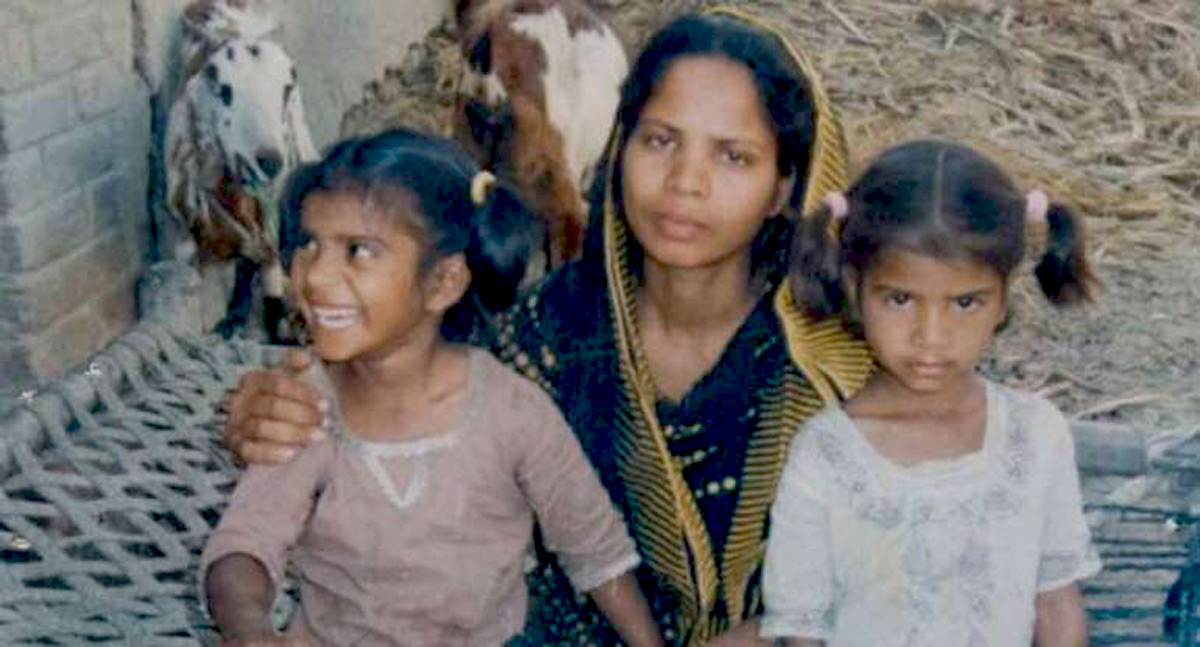Asia Bibi Acquitted. Court Rebukes “Lies” and Blasphemy Against Asia’s Religion

“It appears that after an altercation taking place in the field of Falsa a feast of falsehood had followed . . .”
Pakistan’s Supreme Court issued a stinging rebuke to the false witnesses and illegitimate prosecution of Asia Bibi, a Christian woman accused of blasphemy and sentenced to death.
While the court upheld Pakistan’s blasphemy law, it condemned false accusations, injustice, and insulting Christian beliefs – even quoting Islamic texts against disparaging other religions and an ancient treaty with Christians.
Asia Bibi has spent nearly 10 years in jail. Two government officials were assassinated for defending her, one by his bodyguard who was hailed as a hero. This year, Pakistan’s Chief Justice promised the high court would finally hear her case. Radical Islamists threatened to assassinate the justices and incite violence if she is released from jail.
In its ruling, the Court exposed the multiple contradictions of the two young sisters who were the primary witnesses and the “lies” of those who filed the complaint. The five-day delay in reporting the accusation allowed for stories to be concocted, the court noted.
The accusers “could not be termed as truthful witnesses and the death sentence could not be inflicted on the testimony of such eye witnesses,” the court said.
The justices also quoted Islamic commands that the accusers violated, including lying and blaspheming against Asia’s Christian religion.
The Accusation
Piecing together the conflicting stories, the justices concluded that the accusations stemmed from a quarrel after Asia offered water to Muslim women as they worked in a field. Two young women refused the offer because Asia is Christian.
Later, the women claimed Asia committed blasphemy. The landowner Muhammad Idrees said Asia confessed to blaspheming at a public gathering.
The court noted that “astonishingly” 25 – 30 women were in the field yet “none of the other ladies” reported the matter. Only two who quarreled with Asia claimed she blasphemed – and they did not testify in court.
The two “in connivance with” Muhammad Idrees “ignited the situation and wrongly implicated” Asia.
One justice said, “It appears that Muhammad Idrees was introduced in this case at some later stage by way of an afterthought. Such belated surfacing of the said witness was quite suspicious and in all likelihood he had been planted in this case at some subsequent stage.”
Asia offered to the police to take an oath on the Bible to prove her innocence, which was refused.
Blasphemy
One justice wrote, “the alleged blasphemy” was committed by Asia “after her Muslim co-workers had insulted [Asia’s] religion and had injured her religious sensibilities only because she believed in and was a follower of Jesus Christ.”
The justice noted:
Blasphemy is a serious offence but the insult of the appellant’s [Asia] religion and religious sensibilities by the complainant party and then mixing truth with falsehood in the name of the Holy Prophet Muhammad (Peace Be Upon Him) was also not short of being blasphemous. It is ironical that in the Arabic language the appellant’s name Asia means ‘sinful’ but in the circumstances of the present case she appears to be a person, in the words of Shakespeare’s King Leare, “more sinned against than sinning”.
The court noted:
“If our religion of Islam comes down heavily upon commission of blasphemy then Islam is also very tough against those who level false allegations of a crime.”
The quarrel proved to be a point in Asia’s favor. The “semi-literate young sisters had a reason to level allegations against [Asia] which could be untrue,” the court said. The justices also said the women “had no regard for the truth and they were capable of deposing falsely”.
Because of the “enmity between the accused and the complainant/witnesses, usually a strict standard of proof is applied for determining the innocence or guilt of the accused. If the [witnesses] are found inimical towards the accused, she deserves acquittal on the principle of the benefit of the doubt.”
Accusers Lied
Additionally, the man who filed the criminal complaint, Qari Muhammad Salaam, “had lied.” He was not in the Falsa field, did not hear any of the derogatory remarks, did not remember who drafted the complaint, or where it was filed.
As a justice noted,
“The glaring and stark contradictions in the evidence produced by the prosecution in respect of every factual aspect of this case, noticed by me above, lead to an irresistible and unfortunate impression that all those concerned in the case with providing evidence and conducting investigation had taken upon themselves not to speak the truth or at least not to divulge the whole truth. It is equally disturbing to note that the courts below had also, conveniently or otherwise, failed to advert to such contradictions and some downright falsehood. All concerned would have certainly done better if they had paid heed to what Almighty Allah has ordained in the Holy Qur’an:
“O you who have believed, be persistently standing firm for Allah, witnesses in justice, and do not let the hatred of a people prevent you from being just. Be just, that is nearer to righteousness.”.
Each of the accusers’ stories contradicted the others, and in some cases proved implausible. For example, witnesses said a public gathering on a Friday where Asia was confronted occurred in different houses and ranged from 250 people to 2,000 people – a gathering too large for a small house
If it had lasted over 2 hours, as one witnessed claimed, “then the participants of the gathering, including some religious scholars and Imams of mosques, might have missed their Friday prayers which was not expected of them!”
The justices observed that Asia’s “alleged extra-judicial confession was not voluntary but rather resulted out of coercion and undue pressure”. She was “forcibly brought” to the gathering of hundreds of people “who were threatening to kill her; as such, [the confession] cannot be made the basis of a conviction.”
The “inordinate delay of about five days in lodging” the official complaint against Asia “casts a serious doubt and shadow about the probity of the witnesses, and in fact . . . a false story was concocted by the witnesses and reported to the police,” the justices said.
Why?
A justice offered two possible reasons for the false accusations against Asia Bibi:
[F]irstly, the appellant [Asia] had uttered the offending words after her own religion or religious sensibilities had been insulted and injured by the Muslim co-workers at the spot or, secondly, due to the quarrel taking place between the appellant and her Muslim co-workers at the spot without any offending word having been uttered by the appellant the quarrel was reported by the Muslim ladies to others who then, after deliberating over the matter for five long days, had decided to go after the appellant with a false allegation regarding commission of blasphemy.
Strikingly, a justice blamed the accusers of violating Islamic commands:
“And do not mix the truth with falsehood or conceal the truth while you know [it].”
“do not insult those they invoke other than Allah, lest they insult Allah in enmity without knowledge.”
The justice noted:
“According to the Holy Qur’an a Muslim’s faith is not complete till he believes in all the Holy Prophets and Messengers of Almighty Allah including Jesus Christ (Isa son of Maryam) (Peace Be Upon Him) and all the revealed Holy Books of Almighty Allah including the Holy Bible. From that perspective insulting [Asia’s] religion by her Muslim co-workers was no less blasphemous . . .
“The Muslim co-workers of the appellant [Asia] had violated the command of Almighty Allah by insulting the Deity believed in and the religion followed by the appellant [Asia] and, even if the prosecution’s allegations against the appellant were to be accepted as correct, the stated reaction to the same by the appellant was not different from that warned about by Almighty Allah.”
Muhammad’s Covenant with Christians
Pakistan’s court noted that Muhammad made a covenant with the monks of St. Catherine’s Monastery, at Mount Sinai, around 628 A.D., who requested protection. Muhammad’s “promise was eternal and universal and was not limited to St. Catherine alone,” the court said.
Muhammad “declared that Christians, all of them, were his allies and he equated ill treatment of Christians with violating God’s covenant. It is noticeable that the charter imposed no conditions on Christians for enjoying its privileges and it was enough that they were Christians. They were not required to alter their beliefs, they did not have to make any payments and they did not have any obligations,” the justice wrote.
This charter of rights, called The Promise to St. Catherine, states:
“This is a message from Muhammad ibn Abdullah, as a covenant to those who adopt Christianity, near and far, we are with them.
Verily I, the servants, the helpers, and my followers defend them, because Christians are my citizens; and by God! I hold out against anything that displeases them. No compulsion is to be on them. Neither are their judges to be removed from their jobs nor their monks from their monasteries. No one is to destroy a house of their religion, to damage it, or to carry anything from it to the Muslims’ houses. Should anyone take any of these, he would spoil God’s covenant and disobey His Prophet. Verily, they are my allies and have my secure charter against all that they hate.
No one is to force them to travel or to oblige them to fight. The Muslims are to fight for them. If a female Christian is married to a Muslim, it is not to take place without her approval. She is not to be prevented from visiting her church to pray. Their churches are to be respected. They are neither to be prevented from repairing them nor the sacredness of their covenants. No one of the nation (Muslims) is to disobey the covenant till the Last Day (end of the world).”
Pakistan’s Supreme Court ended their ruling by quoting a Hadith of Muhammad:
“Beware! Whoever is cruel and hard on a non-Muslim
minority, or curtails their rights, or burdens them with more
than they can bear, or takes anything from them against their
free will; I (Prophet Muhammad) will complain against the
person on the Day of Judgment.”
Response to Ruling
Soon after the ruling was released, Islamists demonstrated in Karachi, Lahore, Peshawar and Multan. An Islamist leader said all three Supreme Court justices “deserve to be killed.” The area around the Supreme Court was sealed off by police.
In a televised broadcast, Prime Minister Imran Khan called for calm. Hard-liners were “inciting [people] for their own political gain”.
This is “doing no service to Islam, this is enmity with the country,”
“Who suffers due to this? Our Pakistanis. The common people, the poor. You block the roads, you rob people’s livelihood.”
“Which government can function like this, blackmailed by protests?” Khan said.
